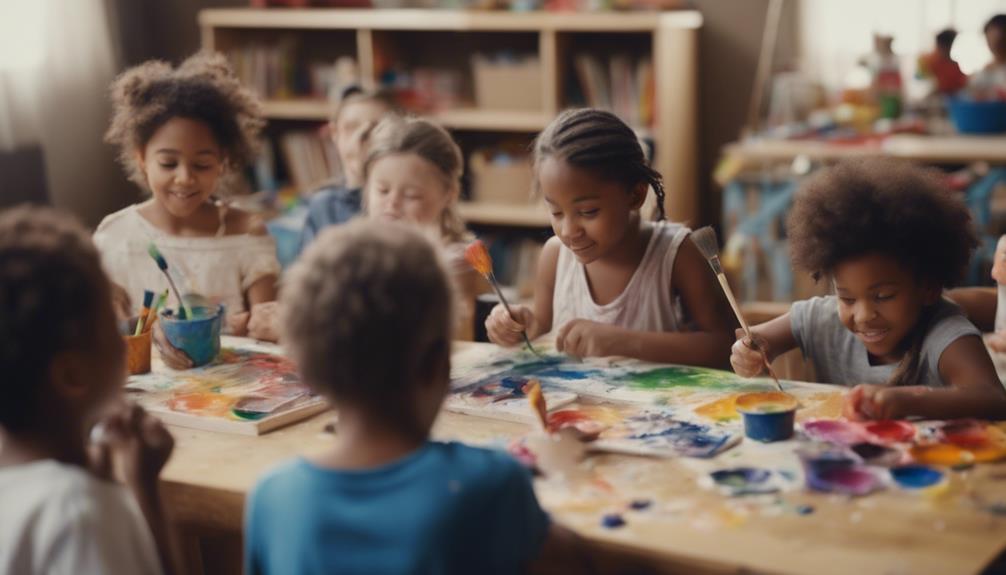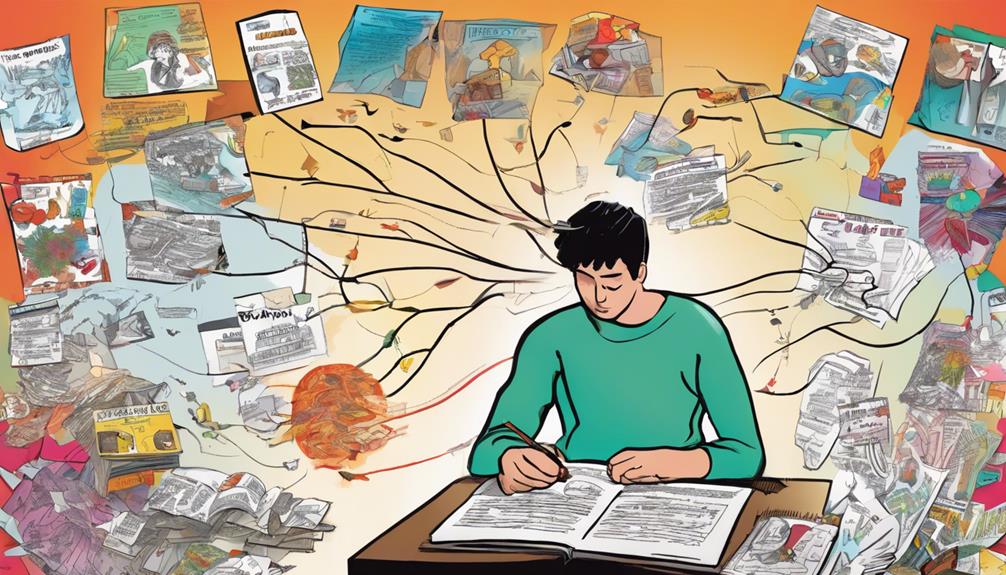Equip your children with vital life skills that will help them succeed. Teach them important skills such as basic first aid, including wound care and emergency response. Stress the importance of good hygiene practices like proper handwashing to prevent illnesses. Encourage responsibility by teaching them how to care for pets and plants, fostering empathy and consistency. Involve them in household chores to develop organizational skills and independence. Promote effective communication by practicing active listening and clear expression. Nurture critical thinking skills that will aid in informed decision-making and problem-solving. Introduce the concept of financial literacy through lessons on budgeting and saving. These valuable skills will provide a solid foundation for their future.
Key Takeaways
- Basic First Aid and Hygiene:
- Teaching essential first aid and hygiene skills for safety and well-being.
- Responsibility and Empathy Building:
- Developing empathy and responsibility through caring for pets, plants, cleaning, and chores.
- Communication and Social Skills:
- Encouraging effective communication, critical thinking, decision-making, and problem-solving skills.
- Financial Literacy Introduction:
- Introducing money management, budgeting, saving, and distinguishing needs from wants.
- Life Skills Development:
- Fostering independence, organization, time management, self-esteem, and a sense of accomplishment.
Basic First Aid
Teaching kids basic first aid skills is vital for their safety and well-being. Equipping children with essential first aid skills empowers them to handle emergencies confidently. Kids can learn valuable first aid skills like cleaning and dressing wounds, applying bandages, and recognizing when to seek adult help.
Knowing how to call emergency services and providing necessary information can be critical in urgent situations. Furthermore, children can grasp basic techniques such as the recovery position for an unconscious person and the Heimlich maneuver for choking incidents.
Understanding not to touch sharp objects or hot surfaces and learning how to cool burns with cold water are fundamental aspects of basic first aid that kids should know. Additionally, identifying common allergens and knowing how to use an EpiPen for severe allergic reactions are valuable skills that can make a significant difference in critical situations.
Basic Hygiene

Maintaining good hygiene is essential for your health.
Handwashing is a simple yet effective way to prevent the spread of germs.
Dental care, like brushing and flossing, is also fundamental for a healthy smile.
Hand Washing Importance
Regular hand washing is an indispensable aspect of basic hygiene for kids. It plays a vital role in reducing the risk of various infections and diseases. By encouraging your child to wash their hands regularly, you can lower the chances of respiratory infections by 16-21% and prevent the spread of diarrheal diseases by up to 50%.
The Centers for Disease Control and Prevention (CDC) recommends washing hands with soap and water for at least 20 seconds to effectively remove germs. It's essential for kids to wash their hands before eating, after using the bathroom, and after touching surfaces in public areas to maintain good hygiene habits.
Teaching your child the importance of hand washing early on can help establish lifelong practices that protect against illnesses. So, remind your kids to scrub those hands thoroughly to keep themselves healthy and prevent the spread of harmful germs.
Dental Care Tips
To maintain good oral hygiene for your kids, ensuring proper dental care is essential. Brushing your child's teeth twice a day for two minutes each time is important in preventing cavities and gum disease. Remember to also encourage daily flossing to remove food particles and plaque between teeth, maintaining overall oral health.
Using fluoride toothpaste when brushing helps strengthen tooth enamel and protects against decay, further enhancing oral hygiene. Additionally, regular dental check-ups every six months play a crucial role in detecting and preventing oral health issues early on.
Caring for Pets and Plants
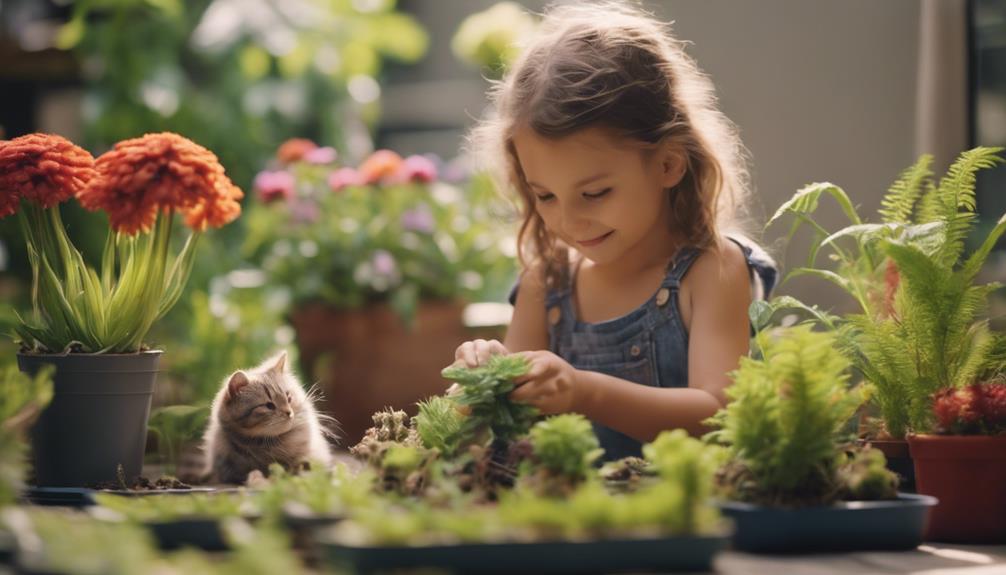
When teaching kids about caring for pets and plants, emphasize the importance of responsibility and empathy in their daily interactions. Caring for pets teaches children valuable life skills that extend beyond the basic needs of animals. Likewise, tending to plants fosters a deeper understanding of the natural world and the interconnectedness of living organisms. Here are some key points to keep in mind:
- Responsibility: By taking care of pets and plants, kids learn the significance of fulfilling tasks consistently and following through on commitments.
- Empathy: Understanding the needs of pets and plants helps children develop empathy by learning to take into account the feelings and well-being of living beings other than themselves.
- Routine Care: Establishing a regular care schedule for pets and plants not only guarantees their health and growth but also instills a sense of discipline and organization in children.
Cleaning and Chores

Engage children in cleaning and chores to instill responsibility and independence from a young age. Assigning age-appropriate tasks not only teaches them valuable life skills but also emphasizes the importance of contributing to the household. By involving children in cleaning and chores, they can enhance their organizational skills and time management abilities. Completing these tasks can boost their self-esteem and provide a sense of accomplishment. Regular practice of cleaning and chores helps children develop good habits that will benefit them in the long run.
| Benefits of Cleaning and Chores for Children | |
|---|---|
| Responsibility | Children learn to be responsible for their share of household tasks. |
| Independence | Engaging in chores fosters independence by teaching children to take care of their own spaces. |
| Organizational Skills | Cleaning activities help children develop organizational skills as they learn to tidy up and prioritize tasks. |
Communication Skills
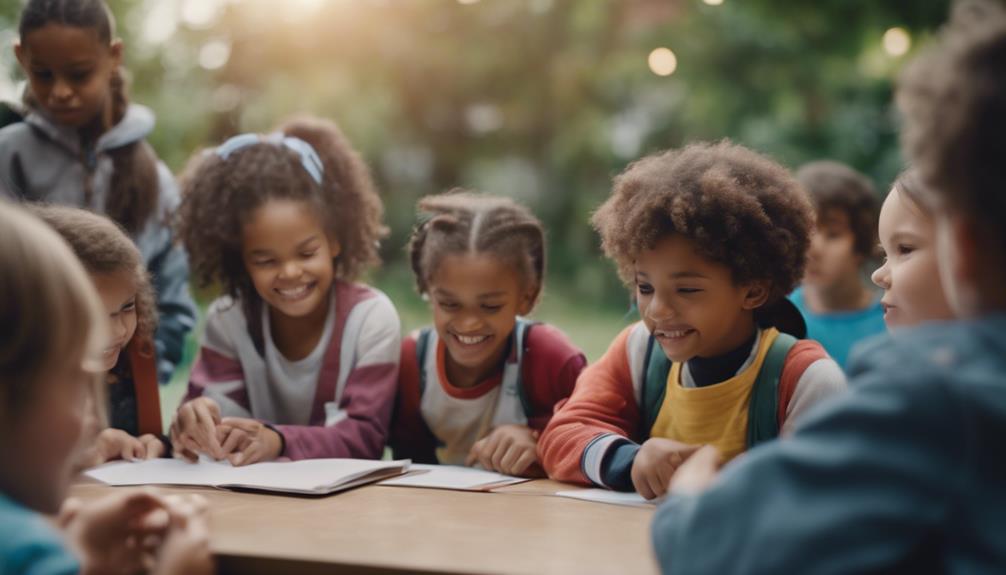
Communication skills are crucial for expressing your thoughts, feelings, and ideas effectively. Active listening, clear speech, and understanding nonverbal cues are key aspects of communication.
Listening Attentively
To listen attentively, focus your full attention on the speaker, maintain eye contact, and avoid distractions. Active listening involves showing interest through body language, nodding, and providing verbal cues like 'I see' or 'That makes sense.'
Encourage children to summarize or repeat what they've heard to enhance listening skills and comprehension. Moreover, practicing listening to various content types such as stories, instructions, or conversations can greatly improve overall listening abilities.
Developing good listening skills early on is essential as it can lead to better communication, stronger relationships, and improved academic performance. By mastering the art of active listening and engaging with the speaker, children can enhance their understanding of the world around them.
Encourage them to listen actively, ask questions for clarification, and reflect on what they've heard to foster effective communication skills from a young age.
Speaking Clearly
Mastering the skill of speaking clearly involves articulating words properly, maintaining a steady pace, and using appropriate volume.
To enhance your communication skills, consider incorporating vocal exercises into your routine. These exercises can strengthen your speech clarity and diction. Additionally, focusing on proper breathing techniques can help improve your speech projection and overall clarity.
Try practicing tongue twisters and vocal warm-ups to fine-tune your articulation. Speaking slowly and enunciating each word can greatly boost your communication effectiveness.
Engaging in activities like storytelling, reading aloud, and public speaking can also aid in developing clear speaking skills.
Nonverbal Cues
Improving your child's understanding and utilization of nonverbal cues can greatly enhance their social interactions and communication skills. Nonverbal cues, such as body language, facial expressions, gestures, and eye contact, are pivotal elements in effective communication.
Here are three key reasons why teaching your child about nonverbal cues is essential:
- Interpreting Emotions: Nonverbal cues help children decipher emotions, enabling them to understand how others feel and respond appropriately.
- Decoding Intentions: By recognizing nonverbal cues, children can better grasp the intentions behind someone's words, fostering clearer communication.
- Navigating Social Situations: Understanding social cues through nonverbal communication assists children in maneuvering various social scenarios with confidence and empathy.
Teaching children to be proficient in nonverbal communication not only enhances their social skills but also boosts their emotional intelligence, empathy, and overall competence in engaging with others effectively.
Critical Thinking
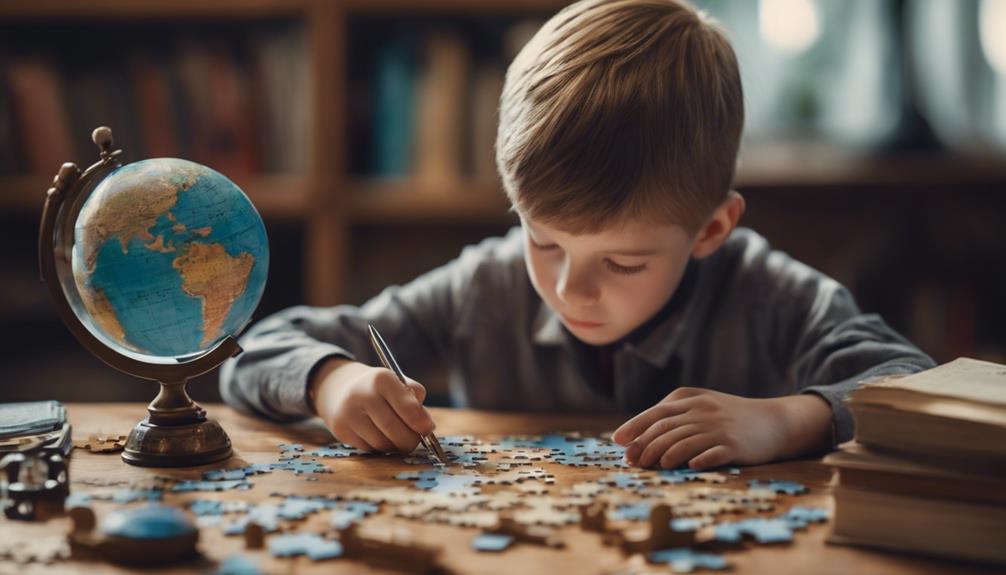
When teaching critical thinking to kids, emphasize the importance of analyzing information, understanding different perspectives, and making informed decisions. Critical thinking is essential for problem-solving and decision-making. Encouraging open-ended play can help children develop these skills in a fun and engaging way. By asking thought-provoking questions and engaging in debates, you can further enhance their critical thinking abilities.
Consider the following aspects of critical thinking:
| Critical Thinking | Benefits |
|---|---|
| Analyzing Information | Evaluate credibility of sources |
| Understanding Perspectives | Solve problems creatively |
| Making Informed Decisions | Think logically |
These elements of critical thinking foster independence, innovation, and the capability to navigate complex situations effectively. Starting to develop critical thinking skills from a young age can lead to improved academic performance, better decision-making abilities, and enhanced problem-solving skills.
Decision-Making Skills

When it comes to decision-making skills, it's all about analyzing your options, considering the consequences, and making choices that align with your values.
By practicing making decisions, seeking guidance, and learning from both successes and failures, kids can hone this essential skill.
Encouraging children to start making age-appropriate choices not only fosters confidence but also helps them become more independent thinkers.
Choices and Consequences
Teaching kids decision-making skills is vital for helping them understand the impact of their choices on outcomes. By fostering these skills, children can navigate through life's challenges with confidence.
Here are some key points to keep in mind when it comes to choices and consequences:
- Understanding the Link: Decision-making skills enable kids to recognize the direct correlation between the choices they make and the outcomes that follow. This awareness is essential for developing a sense of responsibility.
- Learning from Experience: Encouraging children to make decisions allows them to experience both positive and negative outcomes. This firsthand knowledge helps them refine their decision-making process and make better choices in the future.
- Building Critical Thinking: Teaching kids how to analyze options, anticipate consequences, and make informed decisions not only enhances their critical thinking skills but also equips them with the ability to approach problems more effectively.
Problem-Solving Strategies
Using problem-solving strategies is crucial for kids to enhance their decision-making skills and navigate various challenges effectively. Teaching children these strategies helps develop critical thinking skills, enabling them to approach daily tasks with confidence.
By breaking down complex problems into smaller parts, brainstorming solutions, and evaluating different options, kids can learn how to make informed decisions. Encouraging children to practice these decision-making skills from a young age not only fosters independence but also boosts their problem-solving abilities.
Problem-solving strategies empower kids to identify issues, analyze possible solutions, and implement the best course of action. This skill set equips them to handle challenges, resolve conflicts, and make sound choices in academic and social environments.
Critical Thinking Practice
Developing strong critical thinking skills equips children with the ability to make informed decisions based on evidence and logic.
When children engage in critical thinking practice, they enhance their decision-making skills, enabling them to weigh options, consider consequences, and choose the best course of action.
Encouraging kids to think critically not only improves their problem-solving abilities but also leads to better decision-making overall.
Money Management

To instill good money management skills in kids, it is essential to introduce them to basic financial concepts early on. Financial literacy plays an important role in shaping how children perceive and handle money. Teaching kids about budgeting, saving for something they want, and distinguishing between needs and wants are fundamental aspects of money management. Here is a table highlighting key points to help you teach kids about money management effectively:
| Money Management Tips for Kids |
|---|
| 1. Teach the value of money |
| 2. Set savings goals |
| 3. Encourage comparison shopping |
Time Management
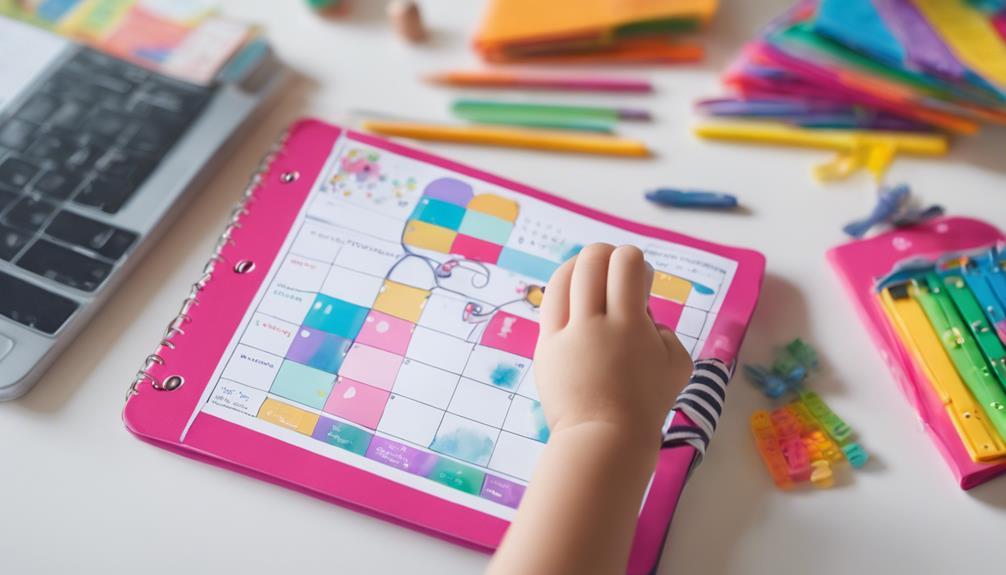
Kids can enhance their productivity and reduce stress by mastering effective time management skills. To improve time management, you should prioritize tasks, create a schedule, and use tools like calendars. Here's how you can develop these skills:
- Prioritize tasks:
Teach kids to identify important tasks and complete them first. By focusing on what needs to be done urgently, they can manage their time more efficiently.
- Create a schedule:
Encourage children to allocate specific time slots for different activities. Having a structured timetable helps them stay organized and guarantees they've enough time for each task.
- Use tools like calendars:
Introduce kids to tools such as calendars, timers, and checklists. These resources can assist them in planning their day, setting reminders, and tracking their progress, leading to better time management outcomes.
Writing Letters
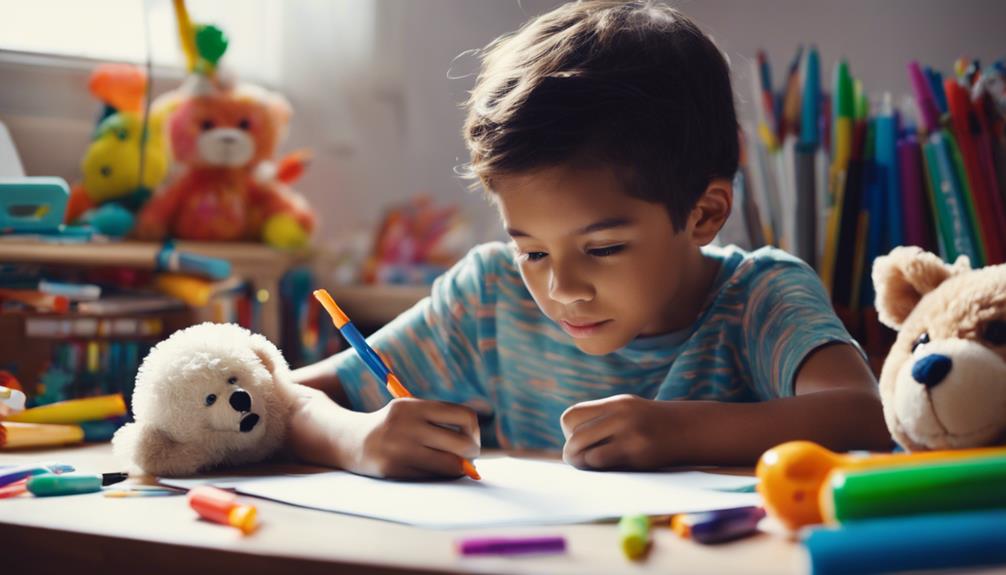
How can children enhance their communication skills in a structured and engaging manner? One effective way is by learning to write letters. Not only does writing letters improve communication skills by providing a format to express thoughts and feelings, but it also offers a practical way to practice spelling, grammar, and punctuation.
Encouraging kids to write letters can foster creativity and imagination as they think about how to effectively convey their message. Additionally, sending letters can help promote empathy and social awareness as children consider the recipient's feelings and perspectives.
Moreover, learning to write letters is beneficial for strengthening fine motor skills and hand-eye coordination. The act of practicing penmanship and forming letters can notably improve these skills in children.
Frequently Asked Questions
What Are the 7 Essential Life Skills?
You need to know the 7 essential life skills. They include decision-making, money management, self-care, communication, resilience, problem-solving, and safety awareness. These skills are vital for handling challenges and building confidence.
What Skills Should an 8 Year Old Have?
You should have basic hygiene habits, effective communication, math, reading, and writing skills. Following instructions, independence in tasks, and taking responsibilities are essential. Problem-solving, empathy, and understanding emotions contribute to social and emotional growth.
How to Teach Kids Basic Life Skills?
To teach kids basic life skills, start by incorporating daily activities like caring for pets and helping with chores. Encourage communication and decision-making through conversations. Foster independence by teaching safety measures and practical skills such as managing money and ordering at restaurants.
What Should a 10 Year Old Know Academically?
You should know that academically, a 10-year-old should have a solid foundation in reading, math, writing, science, and social studies. Understanding texts, basic math operations, writing skills, science concepts, and social studies topics are essential.
Conclusion
To sum up, teaching kids essential life skills is vital for their development and future success. Did you know that children who learn basic first aid skills are more likely to respond confidently and effectively in emergency situations?
By instilling these skills early on, you're empowering your child to be prepared and capable in any situation that may arise. Keep up the great work in teaching them these valuable skills!

